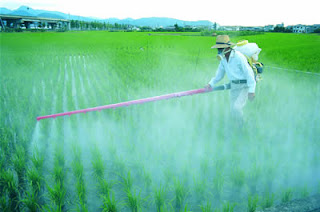Imagine a big farm where they grow corn, beets, potatoes and other vegetables. We are in spring and nature does its job. What is the farmer’s main activity? Does he watch his stuff growing, and waits until August-September to become active again? Certainly not! He has three major activities:
· Spraying fertilizers,
· spraying insecticides, and
· spraying herbicides.
Everybody will tell you that this is normal (same procedure as last year!), and all farmers in the industrialized world are doing this for generations. They even teach future farmers at school when, where and what to spray. Apart from lots of expensive machinery, the farmer has his kids and several workers helping out on the farm; in other words he is managing a capital intensive operation (and mostly highly indebted). One of his biggest problems is the weather dependency, each year a black box! In other words, every penny is needed. No fancy offices, cool suits or fast cars, but instead: hard work.
Apart from new chemicals or more powerful (and expensive) spraying equipment, there is nothing new under the sun. With all my respect to those managing-farmers but is this informational leadership? It certainly isn’t. We will show you how to develop profitable and innovative leadership and how every managing farmer could change his situation and become an informational leader!
But this example is applicable to many industrial organizations, so please try to understand this metaphor and translate it into your own particular environment! So, are you ready? Here we go!
Each managing farmer will tell you that it is normal and of great necessity that chemical fertilizers and pesticides are used. On the question if the use of those two product groups are related, the answer will be: No, not at all!
An informational leader would not answer, but question the issue itself. After some research work, he would soon find out that it was only after chemical fertilizers came into vogue that pesticides came into use! Why was that? He would soon find out that there was an intimate connection between soluble fertilizers and pesticides.
When you look up the word “fertilizer” in the dictionary you will find following definition:”A substance used to make the soil more fertile”! Pretty wrong, the informational leader would say. Impossible to believe that soluble salt nutrients, especially chlorides and nitrates, will make the soil more fertile! On the contrary: those products damage soil biology and ultimately reduce fertility. Potassium muriate consists of 40% Chlorine, and surely kills soil microbes. Nitrogen salts inhibit and kill Nitrogen fixing azotobacters (indicators of good soil).



No comments:
Post a Comment